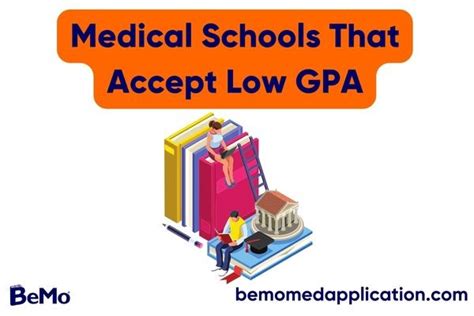For aspiring medical students, achieving a competitive GPA is paramount. However, for various reasons, some students may fall short of the traditional GPA threshold required by many medical schools. Fortunately, there are several medical schools that take a more holistic approach to admissions, considering factors beyond GPA and MCAT scores.

Why GPA Matters
GPA serves as a standardized metric for academic achievement, helping medical schools gauge an applicant’s intellectual capabilities and academic rigor. It demonstrates a student’s consistency and work ethic over an extended period.
How GPA Benefits
- Increased competitiveness: A higher GPA strengthens an application, increasing the likelihood of acceptance to a desired medical school.
- Access to top institutions: Many prestigious medical schools have higher GPA requirements, so a strong GPA opens doors to elite institutions.
- Financial aid eligibility: Some scholarships and grants have GPA-based eligibility criteria, ensuring financial support for students with exceptional academic performance.
Medical Schools with Low GPA Requirements
The table below lists medical schools with low GPA requirements, providing opportunities for students with lower GPAs to pursue their medical aspirations:
| Medical School | Minimum GPA |
|---|---|
| Meharry Medical College | 2.75 |
| Howard University College of Medicine | 3.0 |
| Morehouse School of Medicine | 3.0 |
| Saint Louis University School of Medicine | 3.0 |
| Charles R. Drew University of Medicine and Science | 3.0 |
Advantages of Low GPA Requirements
- Fair access: These schools provide a level playing field for students who may not have had equal opportunities for academic success.
- Focus on diversity: By considering factors beyond GPA, these schools promote diversity and representation in the medical profession.
- Recognition of resilience: Applicants with lower GPAs may have overcome personal challenges or other barriers that have impacted their academic performance.
Considerations
While low GPA requirements provide an opportunity for students with diverse backgrounds, it’s important to note that:
- Competition remains: Even with lower GPA requirements, these schools still have competitive admission processes, and applicants should strive for the strongest possible application.
- MCAT scores matter: Although GPA requirements may be lower, these schools still consider MCAT scores as a significant factor in admissions decisions.
- Extracurricular experiences: Applicants should emphasize their relevant experiences, leadership roles, and community involvement to compensate for lower GPAs.
Table: MCAT Score Averages of Medical Schools with Low GPA Requirements
| Medical School | MCAT Score Average |
|---|---|
| Meharry Medical College | 502 |
| Howard University College of Medicine | 503 |
| Morehouse School of Medicine | 501 |
| Saint Louis University School of Medicine | 500 |
| Charles R. Drew University of Medicine and Science | 503 |
Frequently Asked Questions (FAQs)
1. What is a competitive GPA for medical school?
According to the Association of American Medical Colleges (AAMC), the average GPA for successful matriculants to medical school in 2021 was 3.59.
2. Can I get into medical school with a GPA below 3.0?
Yes, some medical schools, such as those listed above, have lower GPA requirements. However, applicants should have strong compensating factors, such as a high MCAT score or exceptional extracurricular experiences.
3. What factors do medical schools consider besides GPA?
Medical schools also consider MCAT scores, extracurricular activities, letters of recommendation, personal statements, and research experience.
4. Is it possible to improve my GPA before applying to medical school?
Yes, students can improve their GPA by taking additional coursework, retaking classes, or participating in academic enrichment programs.
5. What can I do if my GPA is low but I have other strengths?
Emphasize your strengths in your application by highlighting your MCAT score, extracurricular activities, and any unique experiences or challenges you have overcome.
6. Are there any scholarship opportunities for students with low GPAs?
Yes, some medical schools offer scholarships specifically designed for students with financial need and/or lower GPAs.
7. What are the career prospects for students who graduated from medical schools with low GPA requirements?
Graduates from these schools have the same career opportunities and earning potential as graduates from medical schools with higher GPA requirements.
8. Is it harder to get into medical school with a low GPA?
Yes, it is generally more challenging to get into medical school with a low GPA. However, it is not impossible, especially for applicants who have strong compensating factors.
